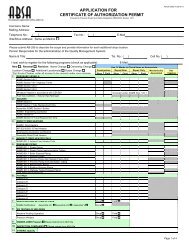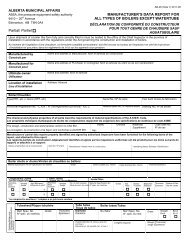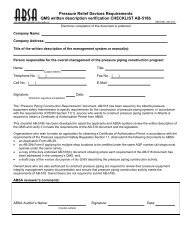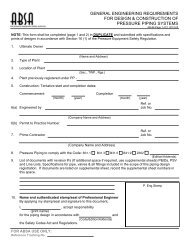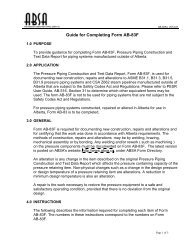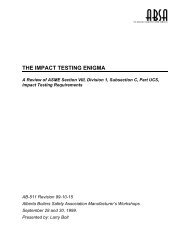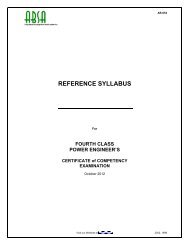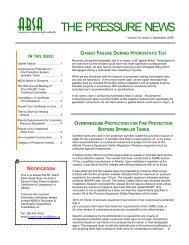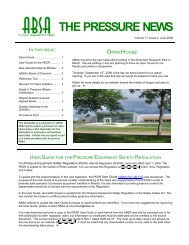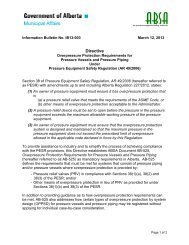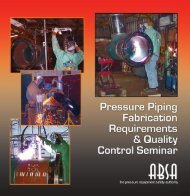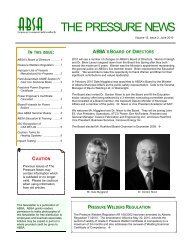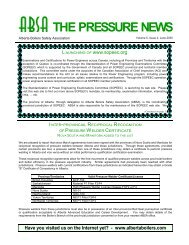- Page 1 and 2:
JANUARY 2007THE REPORT OFTHE BP U.S
- Page 3 and 4:
PANEL STATEMENTProcess safety accid
- Page 5 and 6:
RETIRED ADMIRAL FRANK L. “SKIP”
- Page 7 and 8:
DR. NANCY LEVESON is a Professor of
- Page 9 and 10:
DR. DOUGLAS A. WIEGMANN, Ph.D. is t
- Page 11 and 12:
• Dennis C. Hendershot, Principal
- Page 13 and 14:
The Panel’s FindingsThe Panel foc
- Page 15 and 16:
Process safety cultures at BP’s U
- Page 17 and 18:
Process safety audits. The Panel fo
- Page 19 and 20:
RECOMMENDATION #5 - CLEARLY DEFINED
- Page 23 and 24:
TABLE OF CONTENTSI. The Panel’s R
- Page 25 and 26:
A. Scope and MethodologyI. THE PANE
- Page 27 and 28:
interview, and at least one attorne
- Page 29 and 30:
PROCESS SAFETY REVIEWSThe CSB’s u
- Page 31 and 32:
BP requested that the Panel use the
- Page 33 and 34: would be positive from a process sa
- Page 35 and 36: more of the Panel’s recommendatio
- Page 37 and 38: management systems. The charter doe
- Page 39 and 40: observed at BP are likely not limit
- Page 41 and 42: II. PRECIPITATING EVENTS FOR THE PA
- Page 43 and 44: As the Mogford Report explains, the
- Page 45 and 46: III. OVERVIEW OF PROCESS SAFETY, PE
- Page 47 and 48: elated to personal safety performan
- Page 49 and 50: ENDNOTES FOR SECTION III1 29 C.F.R.
- Page 51 and 52: IV. OVERVIEW OF BP’S ORGANIZATION
- Page 53 and 54: Although lower levels of supervisor
- Page 55 and 56: segment includes the manufacturing
- Page 57 and 58: Browne, who has a diverse backgroun
- Page 59 and 60: BP provides no specific training fo
- Page 61 and 62: The new Safety and Operations funct
- Page 63 and 64: The primary purposes of this new or
- Page 65 and 66: maintain a culture in which reliabi
- Page 67 and 68: TEXAS CITYBP acquired the Texas Cit
- Page 69: 25 BP evaluates (1) “Level 5 Lead
- Page 72 and 73: (7) pre-start-up safety review,(8)
- Page 74 and 75: Assessment, assurance, and improvem
- Page 76 and 77: BP control of work standardBP issue
- Page 78 and 79: BP PROCESS AND PERSONAL SAFETY BOOK
- Page 80 and 81: ENDNOTES FOR SECTION V1 BP addresse
- Page 83: A. Corporate Safety CultureVI. FIND
- Page 87 and 88: contractors and employees in the pr
- Page 89 and 90: A fourth and similar survey item ad
- Page 91 and 92: The Panel recognizes that Browne is
- Page 93 and 94: BP management’s focus on personal
- Page 95 and 96: milestones to guide the efforts of
- Page 97 and 98: Refinery plant manager turnoverUnde
- Page 99 and 100: EMPLOYEE EMPOWERMENTThe Panel belie
- Page 101 and 102: Survey responses substantiate that
- Page 103 and 104: As discussed later in this section,
- Page 105 and 106: U.S. refinery staff and capabilityB
- Page 107 and 108: In 2002, BP commissioned a report b
- Page 109 and 110: The process safety culture survey r
- Page 111 and 112: Worker fatigue and overtimeThe Pane
- Page 113 and 114: As demonstrated below, process safe
- Page 115 and 116: decision to reduce spending on insp
- Page 117 and 118: environmental, and operational goal
- Page 119 and 120: THE PROCESS SAFETY CULTURE AT EACH
- Page 121 and 122: Finally, the Panel’s own observat
- Page 123 and 124: Survey responses from Cherry Point
- Page 125 and 126: process safety culture at the refin
- Page 127 and 128: Table 22‘‘I can report hazardou
- Page 129 and 130: The Panel found other issues that c
- Page 131 and 132: Table 27“In my opinion, process s
- Page 133 and 134: (2) accountabilities for protection
- Page 135 and 136:
All levels of management reported t
- Page 137 and 138:
Table 32“The training that I have
- Page 139 and 140:
Hourly workers interviewed largely
- Page 141 and 142:
Table 34“Refinery management puts
- Page 143 and 144:
Finding:Each of BP’s five U.S. re
- Page 145 and 146:
Table 36“Workers sometimes work a
- Page 147 and 148:
Finally, relatively high percentage
- Page 149 and 150:
Also indicative of perceived noncom
- Page 151 and 152:
ENDNOTES FOR SECTION VI.A1 Meredith
- Page 153:
51 Ibid, p. ii.52 Ibid, p. 153.53 I
- Page 156 and 157:
Finally, because the nature and sco
- Page 158 and 159:
At the Carson, Cherry Point, and To
- Page 160 and 161:
The 2003 audit report for BP South
- Page 162 and 163:
COMPLIANCE WITH INTERNAL PROCESS SA
- Page 164 and 165:
Table 40Percentages of Disagree/Ten
- Page 166 and 167:
Prioritization of inspections and m
- Page 168 and 169:
Whiting (2006) Not all of the alarm
- Page 170 and 171:
Point have implemented the standard
- Page 172 and 173:
the facility siting risk to personn
- Page 174 and 175:
The ANSI Z490.1-2001 standard provi
- Page 176 and 177:
key positions, BP should assess and
- Page 178 and 179:
interviews at some of the refinerie
- Page 180 and 181:
Information relating to BP’s Texa
- Page 182 and 183:
Table 46Percentages of Disagree/Ten
- Page 184 and 185:
Table 48Percentages of Disagree/Ten
- Page 186 and 187:
Table 51Percentages of Disagree/Ten
- Page 188 and 189:
Computer-based training. Based upon
- Page 190 and 191:
TRANSLATING CORPORATE EXPECTATIONS
- Page 192 and 193:
In early 2005, prior to the Texas C
- Page 194 and 195:
The table below contains the substa
- Page 196 and 197:
Interviews with various members of
- Page 198 and 199:
BP’S PROCESS SAFETY MANAGEMENT SY
- Page 200 and 201:
usiness units, to prioritize implem
- Page 202 and 203:
Turnaround deferral procedure (Cars
- Page 204 and 205:
on December 4, 2006. In that recomm
- Page 207 and 208:
C. Performance Evaluation, Correcti
- Page 209 and 210:
valves, and other safety-related eq
- Page 211 and 212:
Tracking of process safety indicato
- Page 213 and 214:
Table 57Number of Overdue Inspectio
- Page 215 and 216:
Although the Panel recognizes that
- Page 217 and 218:
Previous concerns about measuring p
- Page 219 and 220:
BP’s efforts to develop process s
- Page 221 and 222:
BP’S INVESTIGATION AND ROOT CAUSE
- Page 223 and 224:
The Panel also identified some defi
- Page 225 and 226:
Similarly, although mixed responses
- Page 227 and 228:
Other external reviews of BP’s pr
- Page 229 and 230:
Table 62Number of Reported Near Mis
- Page 231 and 232:
Table 64Percentage of Agree/Tend to
- Page 233 and 234:
BP’S PROCESS SAFETY AUDIT SYSTEM>
- Page 235 and 236:
compliance or BP policy (Priority 1
- Page 237 and 238:
Interviews with members of the Safe
- Page 239 and 240:
Refining line management above the
- Page 241 and 242:
The audit team found similar proble
- Page 243 and 244:
The issues that the Panel’s techn
- Page 245 and 246:
USING RESULTS OF INCIDENT INVESTIGA
- Page 247 and 248:
Issue Grangemouth Texas CitySafety
- Page 249 and 250:
CORPORATE OVERSIGHTAn effective pro
- Page 251 and 252:
Selected excerpts from the EEAC rep
- Page 253 and 254:
Group- and refining-level process s
- Page 255 and 256:
Knowledge of performance management
- Page 257 and 258:
Each member of the board needs to a
- Page 259 and 260:
ENDNOTES FOR SECTION VI.C.1 America
- Page 261 and 262:
43 Health & Safety Executive, Devel
- Page 263 and 264:
82 When conducting reviews, BP desi
- Page 265:
138 Health & Safety Executive, Majo
- Page 268 and 269:
cultures, process safety management
- Page 270 and 271:
(i) implement a policy regarding ar
- Page 272 and 273:
(f) educate and provide training to
- Page 274 and 275:
workers are educated, encouraged, a
- Page 276 and 277:
RECOMMENDATION #6—SUPPORT FOR LIN
- Page 278 and 279:
(3) “periodically update”—The
- Page 280 and 281:
RECOMMENDATION #9—BOARD MONITORIN
- Page 282 and 283:
ANNEX I—PROCESS INCIDENT INDEX EX
- Page 284 and 285:
a fatality that results from a mech
- Page 286 and 287:
III. Structure and Operations The C
- Page 288 and 289:
11. On August 10, 2005, the Texas C
- Page 291:
APPENDIX CBP U.S. REFINING ORGANIZA
- Page 295 and 296:
APPENDIX DWHITING RUPTURE DISK: A C
- Page 297 and 298:
B. INADEQUATE REVIEW AGAINST TECHNI
- Page 299:
management review or monitoring pro
- Page 303 and 304:
214-06GEMS 1544316Review of Process
- Page 305 and 306:
Executive SummaryOn March 23, 2005,
- Page 307 and 308:
Based upon its work, the PSM Review
- Page 309 and 310:
Table of ContentsSectionPageExecuti
- Page 311 and 312:
1. IntroductionOn March 23, 2005, t
- Page 313 and 314:
Following these general sampling pr
- Page 315 and 316:
Review of documentsWalkaround inspe
- Page 317 and 318:
3. Discussion of FindingsBased upon
- Page 319 and 320:
3.1 Rupture Disks Under Relief Valv
- Page 321 and 322:
3.2 Equipment Deficiencies - Known
- Page 323 and 324:
Once a site specifies the frequenci
- Page 325 and 326:
System Finding 3 - Equipment inspec
- Page 327 and 328:
accepted good engineering practice
- Page 329 and 330:
Not implementing action items or ta
- Page 331 and 332:
3.9 Compliance Audit Findings - Rep
- Page 333 and 334:
3.11 Near-miss Investigation - Inad
- Page 335 and 336:
from water. However, the PHA report
- Page 337 and 338:
Appendix A - Scope of Work for BP I
- Page 339 and 340:
v. Safety instrumented system desig
- Page 341 and 342:
Appendix B - PSM Review Team Leader
- Page 343 and 344:
Jack McCavitMr. McCavit is Presiden
- Page 345:
14 Guidance on Practice for Design
- Page 348 and 349:
Operations network.performance.Refi
- Page 350 and 351:
C. Performance Evaluation, Correcti
- Page 353:
APPENDIX GPROCESS SAFETYCULTURE SUR
- Page 356 and 357:
INTRODUCTIONWelcome to the BP U.S.
- Page 358 and 359:
I. ABOUT MEIn this section you are
- Page 360 and 361:
SURVEY TERM DEFINITIONSPlease read
- Page 362 and 363:
Safety Values / Commitment to Proce
- Page 364 and 365:
Procedures and EquipmentNote: For e
- Page 366 and 367:
Process Safety TrainingNote: For ea
- Page 368 and 369:
PLEASE DO NOT WRITE ON THIS PAGE.14
- Page 370 and 371:
TermHSSEIncidentISAIsomerization (I
- Page 373:
ACKNOWLEDGEMENTSMembers of the BP U



